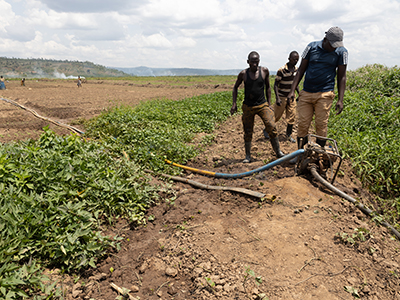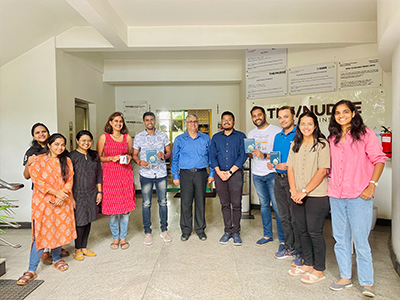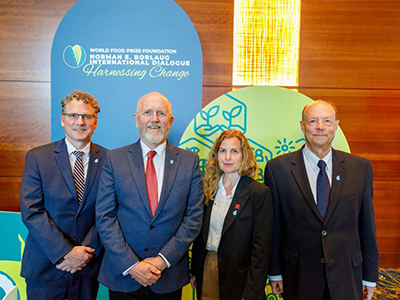Smallholder agricultural water management
DWFI is recognized for its expertise in the sustainable scaling and development of productive smallholder agriculture. This includes research in water management, as well as the ecosystems of policy, finance, and business that enable smallholder farming to thrive. Through collaborations and strategic partnerships, DWFI supports the development of agricultural climate resiliency among the most vulnerable; provides capacity building and professional development to local partners; creates new equitable livelihood opportunities; and increases nutritional security at the household, community and national levels.
Studying farmer access to individual, small-scale irrigation equipment

In Sub-Saharan Africa, only a small proportion of irrigable land is currently irrigated. Effective expansion of irrigation could increase smallholder incomes and climate resilience without compromising underlying natural resources. DWFI supports access to smallholder irrigation by studying how individual, small-scale irrigation equipment reaches farmers through entrepreneurial pathways, often described as “farmer-led irrigation.” In FY2024, DWFI’s team in Rwanda released several reports on a newly discovered “irrigation-as-a-service” business model, and business canvas models, which outline models in which farmers rent or lend irrigation pumps or equipment, expanding the capacity for irrigation.
Supporting smallholder farmers and agtech entrepreneurs in South Asia

South Asia has the largest area of irrigated land, and there are hundreds of millions of smallholder farmers who already irrigate. The challenge is to understand how new technology, business innovation, and water policy can improve smallholder incomes and climate resilience without compromising natural resources. In FY2024, in addition to publishing entrepreneurial ecosystem maps to connect startups to accelerators, DWFI collaborated with The/Nudge Institute DCM Shriram AgWater Challenge, which acted as a catalyst for startups to develop climate-smart agricultural water saving technologies. As part of this partnership, DWFI Research Program Manager Ankit Chandra and DWFI Director of Research Nick Brozović hosted two workshops – the first was virtual and focused on water accounting in agriculture and the second was in person in India and discussed impact narrative and growth strategies for AgWater technologies.
New Feed the Future Innovation Lab for Irrigation and Mechanization Systems launched

With a $19 million grant from USAID received in November 2023, the Feed the Future Innovation Lab for Irrigation and Mechanization Systems (ILIMS) will leverage DWFI’s global connections and smallholder expertise, as well as research at the University of Nebraska to advance science and reduce poverty. With projects focused in the geographic Global South, ILIMS generates research-based evidence to support the growth of vibrant irrigation and mechanization markets; develops strong institutions and local capacity for their sustainability; and fosters opportunities for equitable access.
These goals tie directly to objectives from the U.S. Government Global Food Security Strategy 2022-2026, which include supporting inclusive and sustainable agriculture-led economic growth; strengthening resilience among people and systems; and supporting a well-nourished population, especially among women and children.
In a U.S. Senate Foreign Relations hearing on Global Food Security, U.S. Senator for Nebraska Pete Ricketts and Feed the Future Director Dina Esposito discussed how the new lab is leveraging the institute and the University of Nebraska's expertise in irrigation and water management to expand global food security.
Related articles
- Can irrigation pipes designed to last 5 months last 3 years? (August 7, 2023)
- DWFI to lead new $19 million USAID Feed the Future Innovation Lab (October 26, 2023)
- To improve irrigation and mechanization systems, Ringler drives advancement in foundational questions (April 15, 2024)
- Senator Ricketts mentions DWFI and University of Nebraska’s expertise leading ILIMS in U.S. Senate Foreign Relations hearing (April 16, 2024)
- To scale irrigation and mechanization, Clark will leverage learnings from the Feed the Future Soy Innovation Lab (April 18, 2024)
- Delaney and Chandra discuss small-scale mechanization and sorghum (June 3, 2024)
- Irrigation equipment ownership not always best for smallholder farmerss (DWFI FY23 Annual Report)
- Empowering Communities: the role of cooperative leadership in the success of Hinga Weze’s solar powered irrigation scheme (July 2, 2024)
- Understanding the agtech ecosystem in India can spur future investments (DWFI FY2023 Annual Report)
Top image caption
Caption: Farmers irrigate their fields in Rwanda.
Credit: DWFI
COOKIE USAGE:
The University of Nebraska System uses cookies to give you the best online experience. By clicking "I Agree" and/or continuing to use this website without adjusting your browser settings, you accept the use of cookies.

